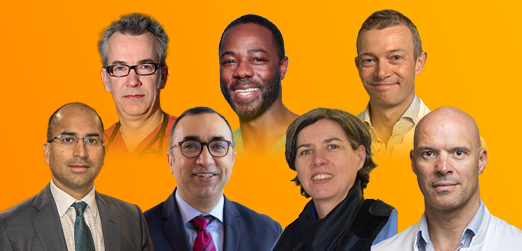- Home
- TAVI – Is Lifetime Patient Management the Alpha to Omega of Contemporary Practice?
TAVI – Is Lifetime Patient Management the Alpha to Omega of Contemporary Practice?
- Intervention
- Structural Heart Disease
Available Credit:
- 1.00
Course Published On:
Course Expiry Date:

Overview
This symposium hosted at Transcatheter Interventions Online 2024 explored cutting-edge advancements in coronary access and valve design within TAVI. Join Dr Darren Mylotte (Galway University Hospitals, Galway, IE), Dr Francesca Sanguineti (Cardiovascular Institute Paris Sud, Paris, FR), Dr Verena Veulemans (University Hospital Düsseldorf, Düsseldorf, DE), Prof David Hildick-Smith (Sussex Cardiac Centre, Brighton and Sussex University Hospitals, Brighton, UK) as they analyse factors affecting coronary access across diverse valve designs and strategies to enhance access. This session provides step-by-step techniques for achieving optimal implant depth and implements guidelines for procedural confirmation in TAVI.
Support Statement
This symposium is supported by an unrestricted educational grant by Boston Scientific.
Disclosure
In compliance with EBAC guidelines, all speakers/chairpersons participating in this programme have disclosed or indicated potential conflicts of interest which might cause a bias in the presentations. The Organising Committee/Course Director is responsible for ensuring that all potential conflicts of interest relevant to the event are declared to the audience prior to the CME activities.
Terms & Conditions
Radcliffe Medicl Education requires contributors to our CME programmes to disclose any relevant financial relationships that have occurred within the past 12 months that could create a conflict of interest. These will be identified in the faculty section if applicable.
The session, ‘TAVI – Is Lifetime Patient Management the Alpha to Omega of Contemporary Practice?’ is accredited by the European Board for Accreditation of Continuing Education for Health Professionals (EBAC) for 1 hour of external CME credits.
Each participant should claim only those hours of credit that have actually been spent in the educational activity. EBAC works according to the quality standards of the European Accreditation Council for Continuing Medical Education (EACCME), which is an institution of the European Union of Medical Specialists (UEMS).
Through an agreement between the European Board for Accreditation of Continuing Education for Health Professionalsand the American Medical Association, physicians may convert EBAC External CME credits to AMA PRA Category 1 Credits™. Information on the process to convert EBAC credit to AMA credit can be found on the AMA website.
Instruction to Participants
There is no fee for taking part in this online learning activity.
Activities are designed to be completed within 90 minutes and must be completed by the registered user. Physicians should only claim credits for time spent on the activity. To successfully earn credit, participants must complete the activity in full in the indicated time frame.
To complete the course and claim certification participants must:
- Read the course outline information supplied and complete pre-test questions if supplied prior to starting the activity. Users must read and study the activity in its entirety before completing the post-test questions.
- Your results will be automatically saved and if a pass score is achieved (where applicable), you may be eligible to claim credit for the activity and receive a certificate of completion.
Target Audience
Target Audience
- Interventional Cardiologists
- Surgeons with an interest in transcatheter treatment strategies for coronary and structural heart disease
- Interventional Cardiology Nurses
Learning Objectives
Learning objectives
- Evaluate the factors influencing coronary access in different valve designs
- Formulate strategies to optimise coronary access based on valve characteristics
- Evaluate the role of valve design in reducing pacemaker implantation rates and enhancing future coronary access
- Learn the step-by-step process for achieving optimum implant depth during TAVI
- Apply guidelines and best practices for achieving and confirming optimum implant depth in TAVI procedures
Module |
Title |
Duration |
Speakers |
|---|---|---|---|
| Session 1 | Welcome & Case Outline | 7m 43s | Darren Mylotte (Galway, IE) |
| Session 2 | Considerations for TAVI Choice in Younger Patients | 10m 35s | Francesca Sanguineti (Paris, FR) |
| Session 3 | Getting Optimum Implant Depth – Step-by-Step Guide | 10m 35s | Verena Veulemans (Düsseldorf, DE) |
| Session 4 | Live Case and Panel Discussion | 27m 14s | David Hildick-Smith (Brighton, UK) Darren Mylotte (Galway, IE) Francesca Sanguineti (Paris, FR) Verena Veulemans (Düsseldorf, DE) |
Considerations for TAVI Choice in Younger Patients
Duration: 10m 35s
Speakers: Francesca Sanguineti (Paris, FR)
Getting Optimum Implant Depth – Step-by-Step Guide
Duration: 10m 35s
Speakers: Verena Veulemans (Düsseldorf, DE)
Live Case and Panel Discussion
Duration: 27m 14s
Speakers: David Hildick-Smith (Brighton, UK) Darren Mylotte (Galway, IE) Francesca Sanguineti (Paris, FR) Verena Veulemans (Düsseldorf, DE)
Chair
Panelist
Operator
TAVI – Is Lifetime Patient Management the Alpha to Omega of Contemporary Practice? programme has been accredited by the European Board for Accreditation of Continuing Education for Health Professionals (EBAC) for 1 CME point, equating to 1 hour of learning. Physicians may convert EBAC External CME credits to AMA PRA Category 1 Credits™.













